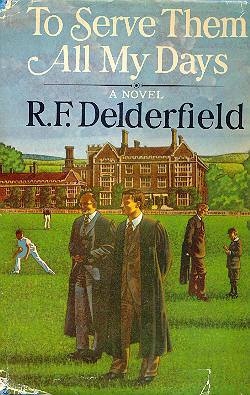To Serve Them all My Days
R.F. Delderfield

This writer is aware that several of our faithful subscribers have already read this book, but she makes no apologies for sharing it in this issue. After all, there is always the possibility that the interest of a reader new to the book will be piqued, which is, of course, part of the reason for including a book review in the Newswire.
To Serve Them all My Days is the story of a young Welshman, David Powlett-Jones, a teacher at a remote English “public” school. Having survived the unbelievable carnage of the Western Front in World War I, Powlett-Jones matures into schoolmaster, and later headmaster, influencing and changing the lives of the hundreds of boys who pass through his care.
David's story, though fiction, is fully believable; the other characters with whom he interacts and whom he comes to know, all contribute to his recovery from the trenches of France and the deaths of his father and brothers in a mining accident in the Welsh valley where he was born.
“They (Powlett-Jones and Herries, who headed Bamfylde when the former arrived to teach) got up by mutual consent and went down the slope towards the nearest of the outbuildings, but when they drew level with the fives court Herries said, “I suppose you're aware of your nickname by now?” and David, suspecting it would be 'Bolshie”, said he had certain suspicions but had thought it best not to pursue them.
“Oh, it's an amiable one,” Herries said, “not like some of them. It stems from your ... consultative methods in class.” He stopped, taking his pipe from his mouth and extending his hand. “Well, goodbye, 'Pow-Wow'. Have a good holiday!” and he wandered off towards the piggeries. David remained standing by the fives court for a moment, thinking, “I've had my share of luck, God knows, but running across him beats anything that happened to me.”
He had a curious afterthought then, concerned with a squat, bowlegged, round-shouldered man, who had died underground in the summer of 1913, a man who, even then, had had unwavering faith in him and had never been diffident about showing it. It was as though his father, feeling the darkness pressing in, had called for help on his behalf, and Herries, walking his rounds on this high plateau, had heard him across the width of the Bristol Channel.”
From his arrival at Bamflyde in 1917 through to the close of the book on New Year's Day in 1941, David's story unfolds in Delderfield's chronicle. It's a true classic, packed with characters and incidents, and illuminated by a wise and deeply compassionate view of human nature and the English experience. Be sure to read all about it.
All Rights Reserved.